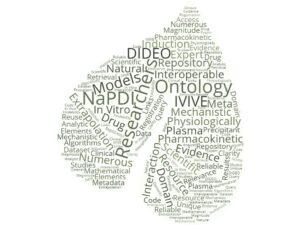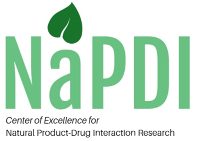
Intended Audience
The NaPDI site is intended to serve a diverse group of researchers interested in the assessment of pharmacokinetic natural product-drug interactions.
The NaPDI site and associated data repository intend to provide reliable resources where researchers can access scientific results, raw data, and recommended approaches to assess the clinical relevance of pharmacokinetic natural product-drug interactions.
 |
||
| In vitro: Data derived from in vitro systems include parameters describing natural product constituent binding (fu,plasma, fu,mic), metabolism and transport (Km, Vmax), inhibition potency (IC50, Ki), and induction potential (EC50, Emax). | IVIVE: In vitro to in vivo extrapolation approaches encompass various mathematical models to predict the magnitude of pharmacokinetic natural product-drug interactions. Mathematical models include static, mechanistic static, and fully mechanistic physiologically-based pharmacokinetic interaction models. | Clinical: Appropriately designed clinical pharmacokinetic interaction studies, in which the natural product is the precipitant and a drug (or drugs) is the object, provide definitive assessment of interaction risk. Clinical data include pharmacokinetic outcomes (AUC, Cmax, tmax, t1/2) describing object drug disposition in the absence and presence of the precipitating natural product. |
Precipitant: a xenobiotic that alters the pharmacokinetics of the object drug
Object: the drug affected by the interaction of prior or concomitant administration of the precipitant
Data Repository
All data generated from NaPDI Center activities are organized and archived into an open-access repository that is publicly accessible through a website created and managed by the Informatics Core.
Ontology
The NaPDI Center uses ontologies to foster the reuse and interoperability of natural product-drug interaction data stored in the repository. Domain experts have produced a list of terms used in the repository. For each term, an ontology expert maps the definitions to existing ontologies. Terms that are not present in existing ontologies are created within the Drug-Drug Interaction and Evidence Ontology (DIDEO). Each term has a unique identifying code that researchers and computer programs can use to query the repository.
Access Policies
All published data generated by the NaPDI Center are available to researchers through the repository. Natural product chemical characterization data are available to researchers upon request, including certificate of analysis-style reports and spectra from mass spectrometry and 1H NMR.
FAIR Data Principles
The NaPDI Center strives to ensure that pharmacokinetic natural product-drug interaction data satisfy the four foundational principles of good data management and stewardship — Findability, Accessibility, Interoperability, and Reusability (FAIR).
- Findability: Each dataset receives a globally unique and persistent (meta)data identifier. This identifier enables registration and indexing of pharmacokinetic natural product-drug interaction data for discoverability.
- Accessibility: The NaPDI Center data repository uses an ontology (DIDEO) to provide clarity on the relationship between pharmacokinetic natural product-drug interaction metadata and the datasets described by that metadata. Documentation available through this website explains how to deposit data for easy open access retrieval. The repository makes distinctions among in vitro, in vivo, and chemical characterization data.
- Interoperable: The NaPDI Center data repository uses ontologies for all pharmacokinetic natural product-drug interaction data elements and provides links to term definitions through the user interface. Each definition has a unique identifying code that researchers and computer programs can use to query the repository.
- Reusability: Documentation available on this website provides clarity about data quality assurance and provenance, data usage restrictions, and the algorithms and tools required for reusability.
More details are provided in the following publication:
Birer-Williams C, Gufford BT, Chou E, Alilio M, VanAlstine S, Morley RE, McCune JS, Paine MF, Boyce RD. A New Data Repository for Pharmacokinetic Natural Product-Drug Interactions: From Chemical Characterization to Clinical Studies. Drug Metab Dispos, 48(10):1104-1112, 2020. PMID: 32601103
